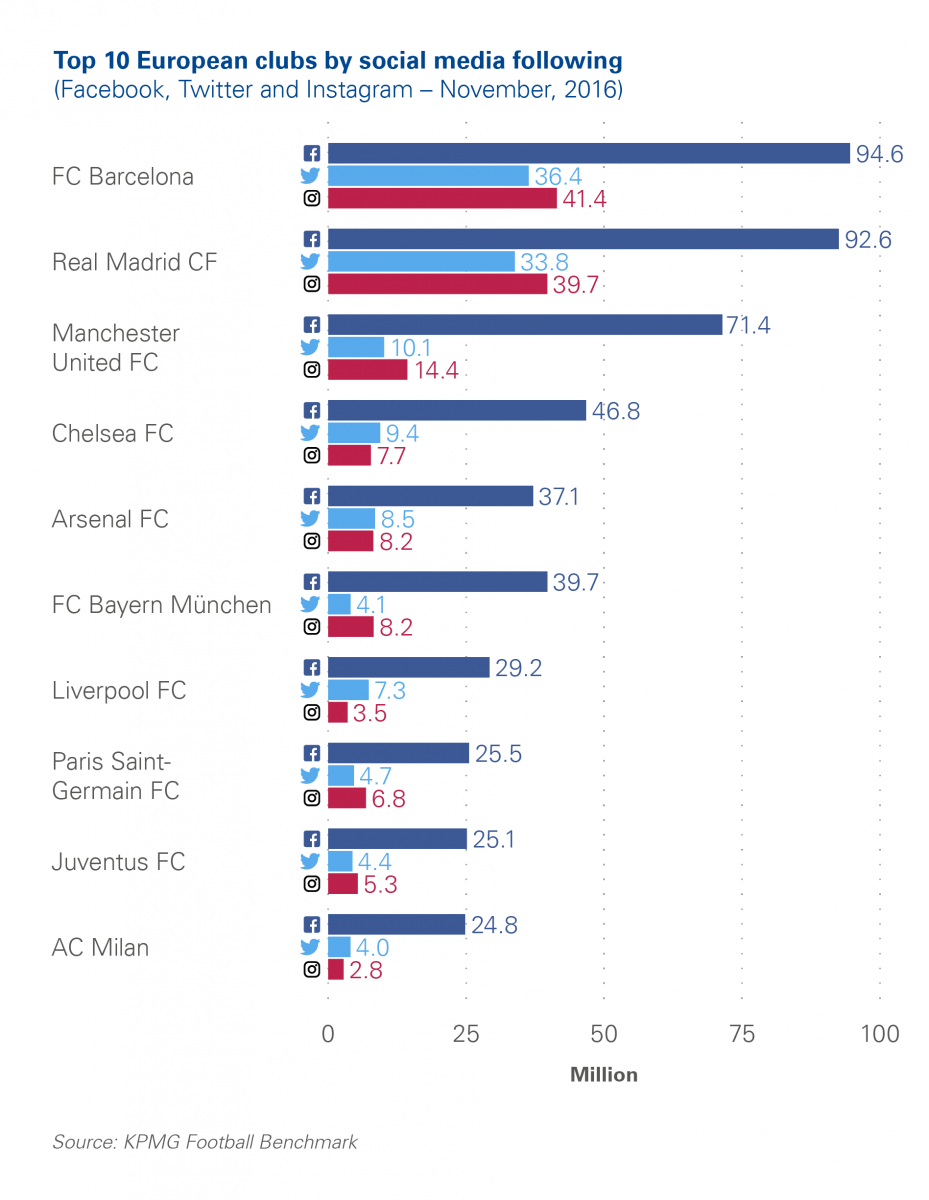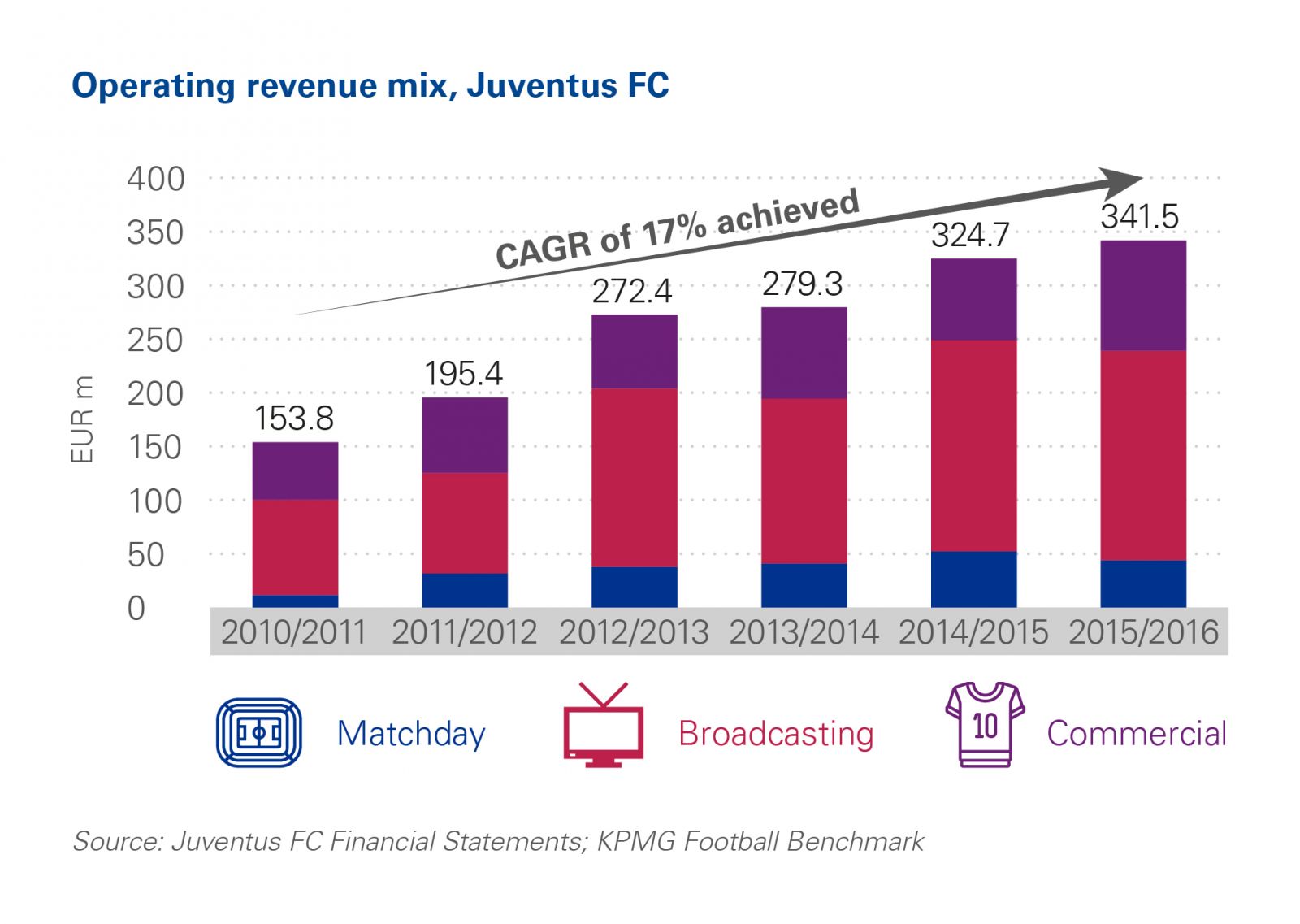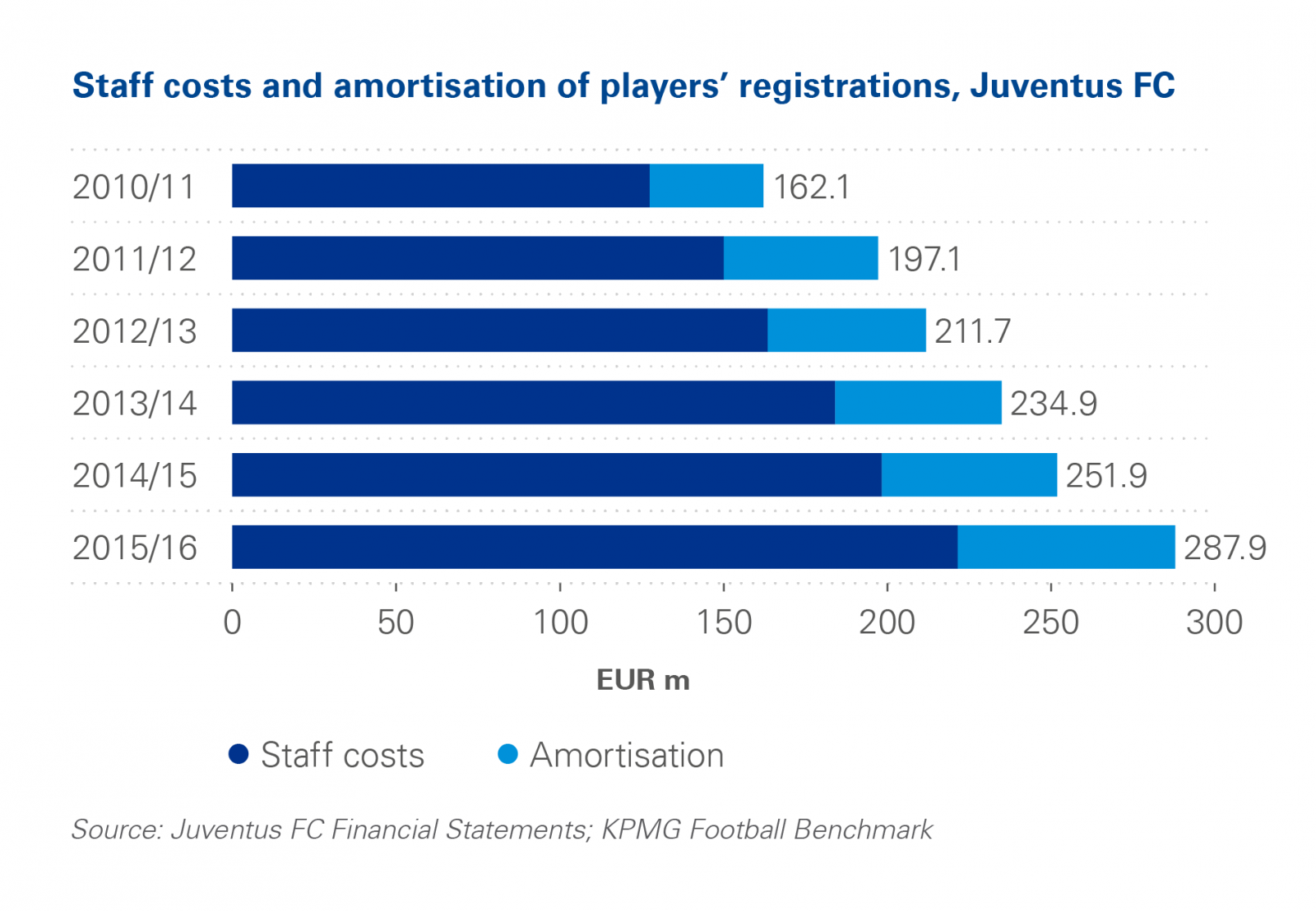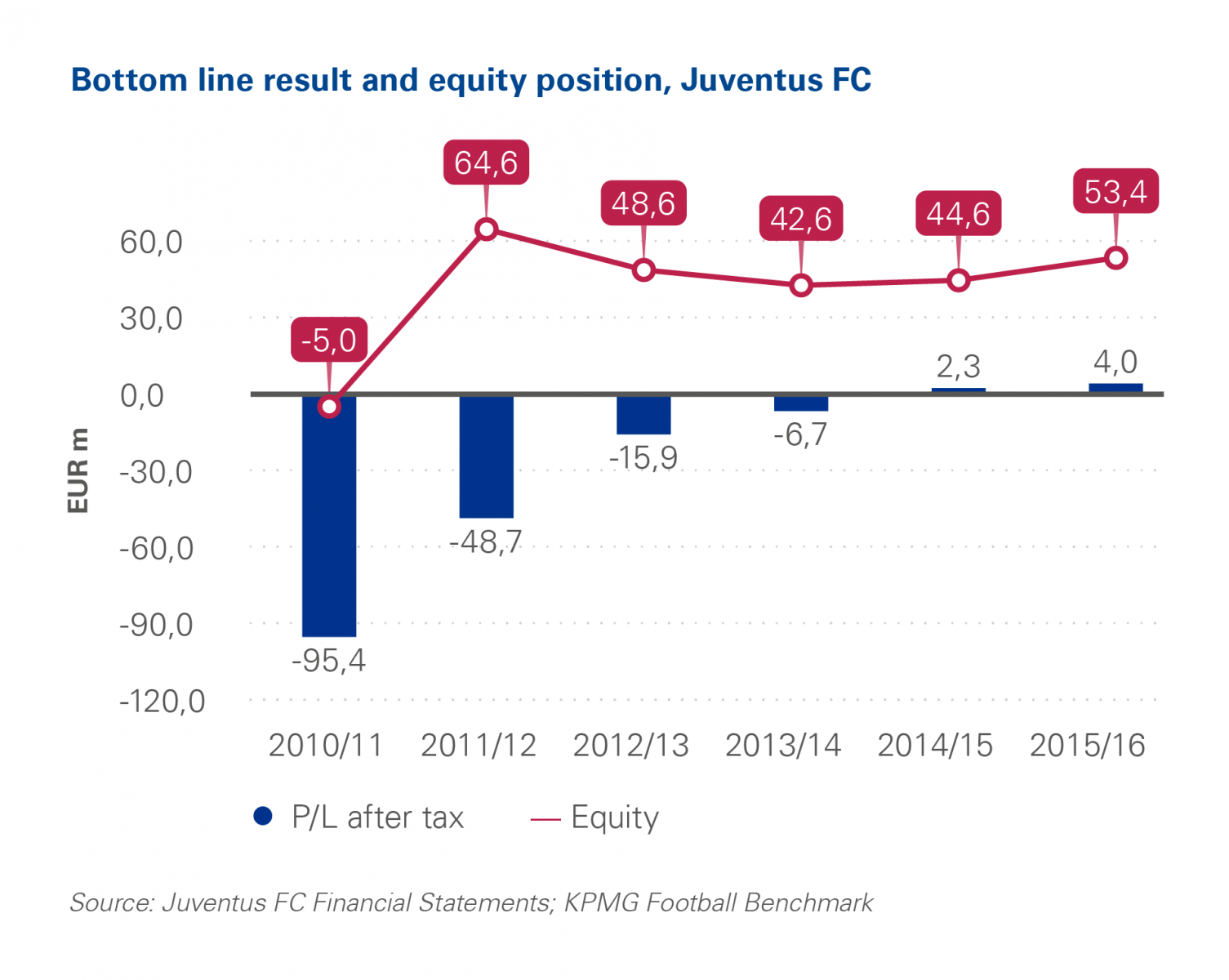The Andrea Agnelli era
Over the past decade, Juventus FC’s fortunes have contrasted wildly, ranging from off-the pitch problems which led to the first relegation in Serie B in the club’s history to the current period of unprecedented success on the football field.
In the summer of 2006, the Calciopoli scandal[1] saw Juventus FC enter a dark period in the club’s long history and, during various seasons, the club were unable to keep the pace - on and off the pitch - with their major domestic and international counterparts. At the end of the 2010/11 season, Juventus FC recorded operating revenues of EUR 154 million, a net loss of EUR 95 million and finished in 7th place in Serie A.
This season, the Bianconeri, after winning the 6th consecutive domestic title in a row and looking forward to the UEFA Champions League final against Real Madrid CF, announced operating revenues for the 2015/16 season of EUR 341 million, more than twice the figure for 2010/11, and a net profit of EUR 4 million for the second successive season. In this article, the KPMG Football Benchmark team provides an analysis of the resurgence of Juventus FC since Andrea Agnelli took over the responsibility of managing the club.
When Agnelli was appointed in 2010, he became the fourth member of the family to become President of Juventus FC, inheriting a club that was still trying to overcome the fallout of Calciopoli. While the club’s situation did not greatly alter in his initial season, the club’s turnaround gathered momentum with the inauguration of the wholly-owned, new Juventus Stadium on September 2011.
The clubs’ new home, with 14,000 more seats than the Stadio Olimpico and a higher proportion of hospitality seats, signalled a landmark not only for Juventus FC but also for Italian football, as the vast majority of Serie A clubs play in municipality-owned facilities and cannot capitalise on the competitive advantages of owning their own stadium. Since the inauguration of Juventus Stadium, the Old Lady has not only recorded an impressive win rate of 78% (105 of 134 home matches) but also increased matchday revenues at a Compound Annual Growth Rate (CAGR) of 31%, from EUR 11.5 million in 2010/11 (last year at the Stadio Olimpico) to EUR 44.1 million at the end of last season.
 In the period under analysis, commercial revenue also witnessed a significant growth (CAGR of 17%) as Juventus’ profited from their growing international exposure to tap global fan bases, surpassing AC Milan as the most followed Italian club on social media, and to partially bridge the gap with their major European counterparts.
In the period under analysis, commercial revenue also witnessed a significant growth (CAGR of 17%) as Juventus’ profited from their growing international exposure to tap global fan bases, surpassing AC Milan as the most followed Italian club on social media, and to partially bridge the gap with their major European counterparts.

Juventus’ appeal to commercial partners was confirmed by last season’s EUR 27 million rise in commercial revenues, mainly attributable to an increased technical sponsor deal with Adidas (EUR 23 million compared to previous EUR 13 million signed with Nike), an increased jersey sponsor deal with Jeep (EUR 17 million compared to previous EUR 13 million) and the club’s successful direct control of licensing and merchandising.
In addition to the club’s international strategy, which resulted in various regional partnerships (Mexico, Nigeria and Azerbaijan) and significant efforts in the digital space, Juventus FC have also started work on the JVillage, a development in the proximity of their stadium that is scheduled to open by the end of 2017 and will include the new headquarters and training centre, a hotel, a concept store and an international school.
As notable as the increase in matchday and commercial income has been, Juventus’ main source of revenue is broadcasting, accounting for 57% of the total for 2015/2016. Domestically, Juventus’ recent success and the collective distribution process in place for broadcasting revenues in Italy, based on historical results and fan base, makes the club one of the highest earners from this source across the whole of Europe. However, a vital segment of that income is derived from continued participation in the UEFA Champions League, which in 2015/16 accounted for EUR 76 million in prize money.

As a consequence of the club’s efforts to maintain the highest level of competitiveness, investments in staff over the past six years have risen on an annual basis. Indeed, staff costs’ and amortisation of players’ registrations’ CAGR of 12% and 14%, respectively, during this period, seems justified by Juventus FC five domestic titles in a row, a sequence that has not been achieved in Italian football since the 1930s, and their first Champions League final in 12 years, although lost against FC Barcelona in 2015.

During that same timespan, Juventus’ steady revenue growth, and the EUR 130 million net profit on the disposal of players, helped the club to complete a turnaround that has seen bottom line result surge from a EUR 95 million loss in 2010/11 to a EUR 4 million profit in 2015/2016. Undoubtedly the launch of a EUR 120 million capital increase at the end of 2011 was a major landmark to foster financial sustainability and complement the improvement in the year-end result with a solid equity position (see chart below).

While Juventus Stadium has proved to be a key competitive advantage so far, some challenges remain for the club. Matchday revenues, limited by capacity and ticket prices, may not show a significant increase in the next few years. Furthermore, Italy’s Serie A has had only moderate appeal in recent seasons. The league’s domestic broadcasting revenues, now placed in third position among the “big five”, will also be exceeded by the Bundesliga from 2017/18.
As a result, it will be especially important for Juventus FC to continue growing their commercial revenues, monetising on the club’s broad popularity and building a presence in overseas markets, in order to remain competitive on the international stage. Further triumphs, especially at European level, would certainly help strengthening the Bianconeri commercial proposition.
Further investigation into this and related topics, as well as analysis of industry data, can be undertaken for you by KPMG Sports Advisory Practice. Our subject matter experts can also assist stakeholders in assessing and interpreting the potential impact on their organizations of any particular piece of research, identifying the underlying reasons behind specific trends or developing potential solutions and considering future scenarios.
[1] Juventus FC were relegated ex officio to the second-tier of Italian football because of alleged wrongdoing; furthermore, their 2004/05 title was withdrawn and not assigned, while their 2005/06 title was assigned to FC Internazionale.


